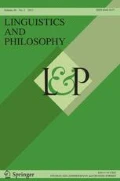Abstract
This paper is about the relationship between two questions: the question of what the objects of assertion are and the question of how best to theorise about ‘shifty’ phenomena like modality and tense. I argue that the relationship between these two questions is less direct than is often supposed. I then explore the consequences of this for a number of debates in the philosophy of language.
Similar content being viewed by others
References
Anand, P. (2006). De de se. Ph.D. thesis, MIT.
Anand P., Nevins A. (2004) Shifty operators in changing contexts. In: Young R.B. (Ed.) Proceedings from semantics and linguistic theory XIV. Cornell University, CLC Publications, Ithaca, NY
Austin J.L. (1971) Philosophical papers (2nd Edn.). Clarendon Press, Oxford
Cappelen H., Hawthorne J. (2009) Relativism and monadic truth. Oxford University Press, Oxford
Cresswell M.J. (1990) Entities and indices. Kluwer, Dordrecht
Dowty D. (1982) Tenses, time adverbs, and compositional semantic theory. Linguistics and Philosophy 5: 23–55
Dummett M. (1991) The logical basis of metaphysics. Harvard University Press, Cambridge, MA
Egan A., Hawthorne J., Weatherson B. (2005) Epistemic modals in context. In: Preyer G., Peter G. (eds) Contextualism in philosophy. Oxford University Press, Oxford
Heim, I. (2004). Lectures notes on indexicality. Notes for class taught at MIT.
Heim I. (2008) Features on bound pronouns. In: Harbour D., Adger D., Béjar S. (eds) Phi-theory: Phi-features across modules and interfaces. Oxford University Press, Oxford
Heim I., Kratzer A. (1998) Semantics in generative grammar. Blackwell, Oxford
Kaplan D. (1989) Demonstratives. In: Almog J., Perry J., Wettstein H. (eds) Themes from Kaplan. Oxford University Press, New York, pp 481–563
King J.C. (2003) Tense, modality, and semantic values. Philosophical Perspectives 17: 195–245
Kratzer A. (1998) More structural analogies between pronouns and tenses. In: Strolovitch D., Lawson A. (eds) Proceedings from semantics and linguistic theory VIII. Cornell University, CLC Publications, Ithaca, NY
Kratzer A. (2009) Making a pronoun: Fake indexicals as windows into the properties of pronouns. Linguistic Inquiry 40: 187–237
Kusumoto, K. (1999). Tense in embedded contexts. Ph.D. thesis, University of Massachusetts, Amherst.
Kusumoto K. (2005) On the quantification over times in natural language. Natural Language Semantics 13: 317–357
Lasersohn P. (1999) Pragmatic halos. Language 75: 522–551
Lewis, D. K. (1979). Attitudes de dicto and de se. Philosophical Review, 88, 513–543. (Reprinted in Lewis, D. K. (1983). Philosophical papers (Vol. I, pp. 133–159). New York: Oxford University Press.)
Lewis, D. K. (1980). Index, context, and content. In S. Kanger & S. Öhman (Eds.), Philosophy and grammar (pp. 79–100). Dordrecht: D. Reidel Publishing Company. (Reprinted in Lewis, D. K. (1998). Papers in philosophical logic (pp. 21–44). Cambridge: Cambridge University Press.)
MacFarlane J. (2003) Future contingents and relative truth. The Philosophical Quarterly 53: 321–336
MacFarlane J. (2009) Nonindexical Contextualism. Synthese 166: 231–250
Ninan D. (2010) De se attitudes: Ascription and communication. Philosophy Compass 5: 551–567
Partee B. (1973) Some structural analogies between tenses and pronouns in English. The Journal of Philosophy 70: 601–609
Percus O. (2000) Constraints on some other variables in syntax. Natural Language Semantics 8: 173–229
Portner P. (2009) Modality. Oxford University Press, New York
Prior A.N. (1968) Papers on time and tense. Oxford University Press, Oxford
Recanati F. (2004) Literal meaning. Cambridge University Press, Cambridge
Recanati F. (2007) Perspectival thought: A plea for (moderate) relativism. Oxford University Press, Oxford
Richard M. (1982) Tense, propositions, and meanings. Philosophical Studies 41: 337–351
Schaffer, J. (forthcoming a). Necessitarian propositions. Synthese.
Schaffer, J. (forthcoming b). Perspective in taste predicates and epistemic modals. In A. Egan & B. Weatherson (Eds.), Epistemic modality. Oxford: Oxford University Press.
Schlenker, P. (1999). Propositional attitudes and indexicality: A cross-categorial approach. Ph.D. thesis, MIT.
Schlenker P. (2003) A plea for monsters. Linguistics and Philosophy 26: 29–120
Schlenker P. (2004) Person and binding (a partial survey). Italian Journal of Linguistics/Rivista di Linguistica 16: 155–218
Schlenker P. (2006) Ontological symmetry in language: A brief manifesto. Mind and Language 21: 504–539
Stalnaker, R. (1978). Assertion. In P. Cole (Ed.), Syntax and Semantics 9: Pragmatics (pp. 315–332). New York: Academic Press. (Reprinted in Schlenker, P. (1999). Context and content (pp. 78–95). New York: Oxford University Press.)
Stanley J. (1997a) Names and rigid designation. In: Hale B., Wright C. (eds) A companion to philosophy of language. Blackwell Publishers, Oxford
Stanley J. (1997b) Rigidity and content. In: R. Heck (Ed.) Language, thought, and logic. Oxford University Press, Oxford, pp 131–156
Stanley J. (2000) Context and logical form. Linguistics and Philosophy 23: 391–434
Stanley J. (2002) Modality and what is said. Philosophical Perspectives 16: 321–344
Stanley, J. (2005). Review of François Recanati, literal meaning. In Notre Dame philosophical reviews. (Reprinted in Stanley, J. (2007). Language in context (pp. 231–247). Oxford: Clarendon Press.)
Stephenson T. (2007) Judge dependence, epistemic modals, and predicates of personal taste. Linguistics and Philosophy 30: 487–525
Stone, M. (1997). The anaphoric parallel between modality and tense. Technical report, University of Pennsylvania.
von Stechow, A. (2002). Binding by verbs: Tense, person and mood under attitudes. Unpublished manuscript.
von Stechow, A. (2003). Feature deletion under semantic binding: Tense, person, and mood under verbal quantifiers. In M. Kadawaki & S. Kawahara (Eds.), Proceedings of NELS (Vol. 33, pp. 379–404). Charleston: BookSurge Publishing.
Weatherson B. (2008) Attitudes and relativism. Philosophical Perspectives 22: 527–544
Williamson T. (2000) Knowledge and its limits. Oxford University Press, Oxford
Yalcin S. (2007) Epistemic modals. Mind 116: 983–1026
Author information
Authors and Affiliations
Corresponding author
Rights and permissions
About this article
Cite this article
Ninan, D. Semantics and the objects of assertion. Linguist and Philos 33, 355–380 (2010). https://doi.org/10.1007/s10988-011-9084-7
Published:
Issue Date:
DOI: https://doi.org/10.1007/s10988-011-9084-7




